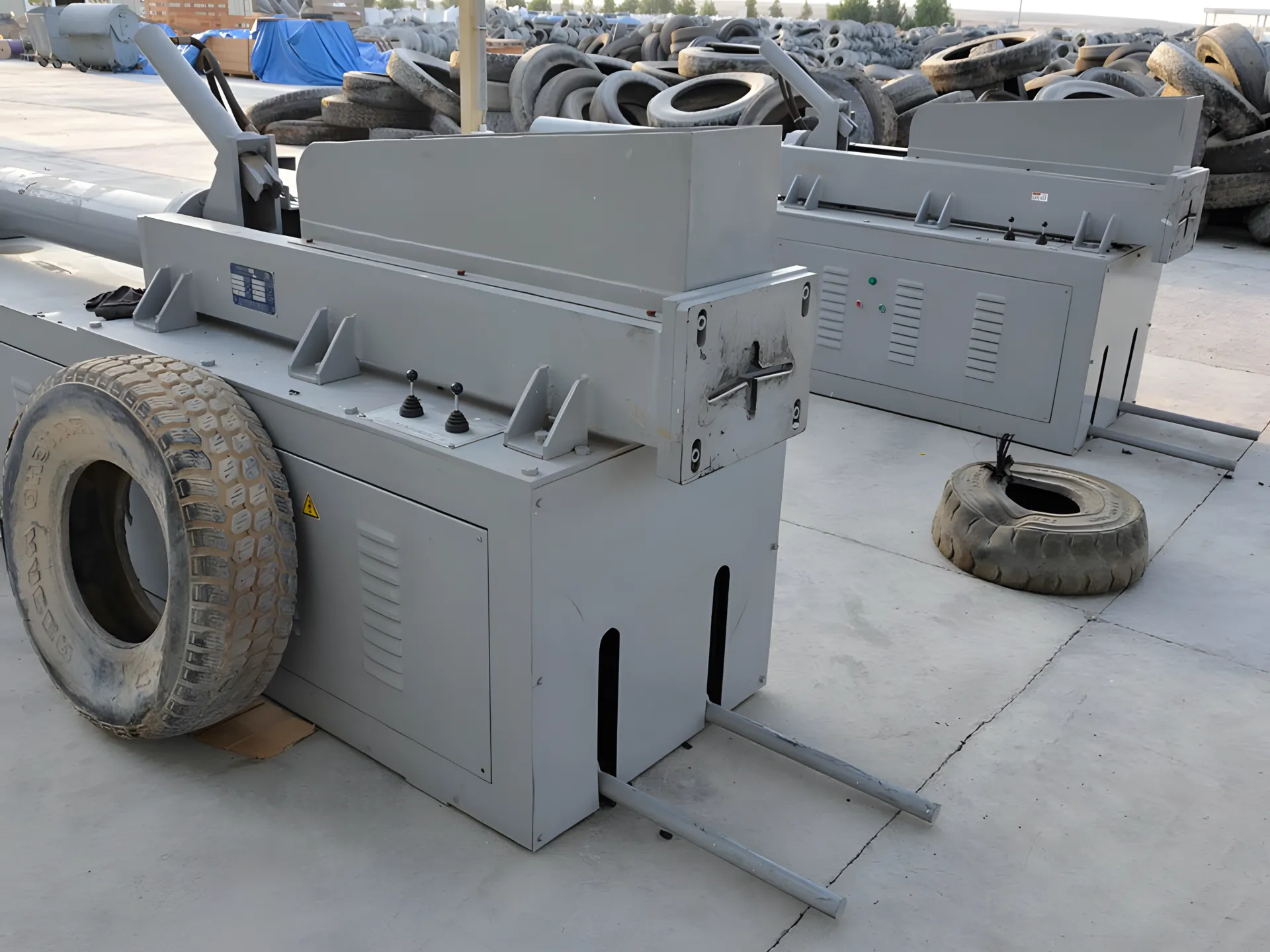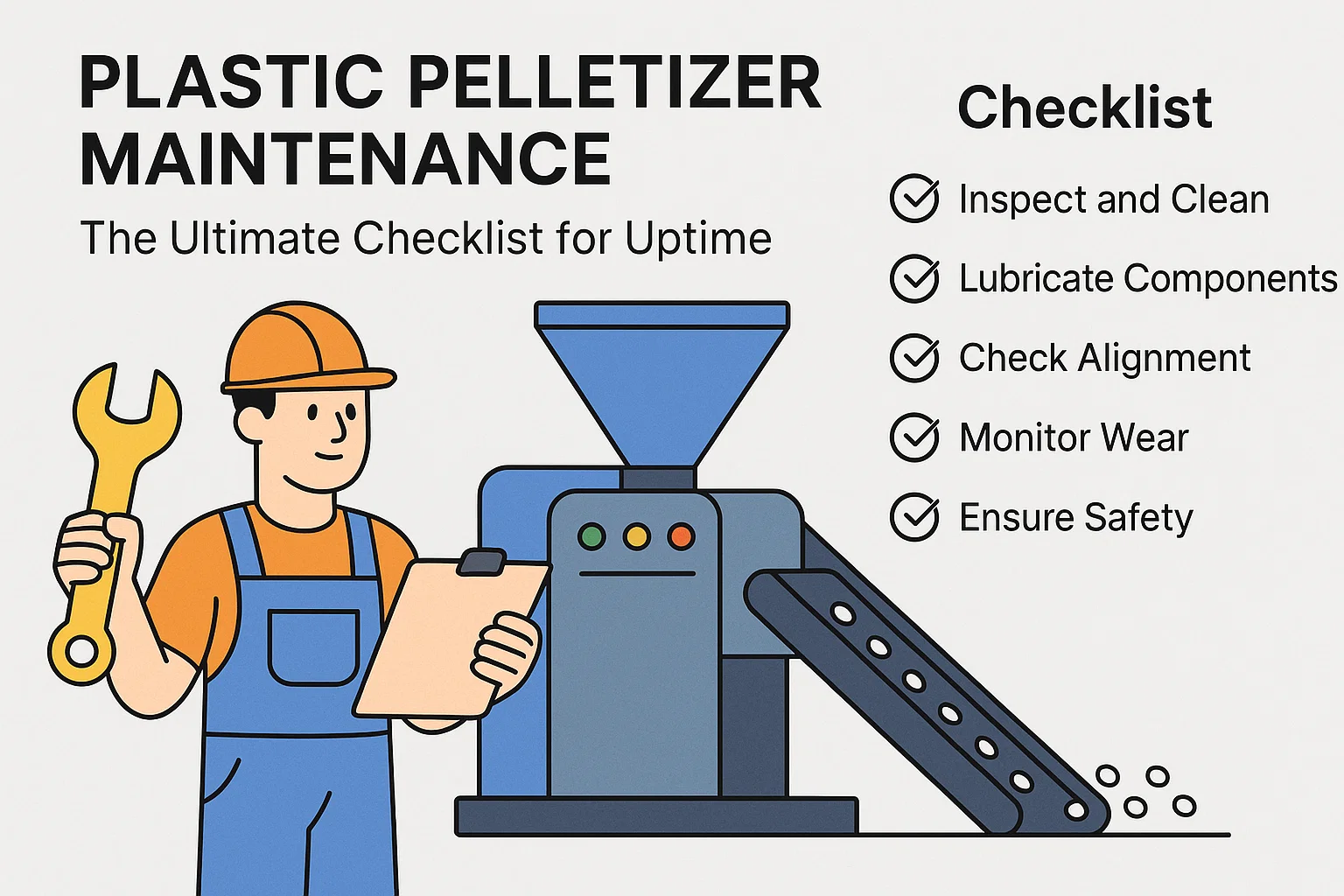Introduction: The Unseen Hero of Your Recycling Line
In the complex and demanding world of industrial plastic recycling, the plastic pelletizer is the final, critical step. It’s the machine that transforms processed plastic flake into uniform, high-value pellets ready for the manufacturing market. Its consistent and reliable operation is directly linked to your plant's profitability and reputation. However, like any piece of high-performance industrial machinery, a pelletizer’s peak performance is not a given; it is the result of diligent, proactive maintenance.
Unexpected downtime, inconsistent pellet quality, and premature component failure are not just operational headaches—they are significant drains on your bottom line. This is where a structured maintenance strategy becomes one of the most valuable investments you can make. At Energycle Machine, we don’t just engineer robust and efficient recycling equipment; we partner with our clients to ensure they achieve maximum return on their investment throughout the machine's entire lifecycle.
This comprehensive guide provides a detailed maintenance checklist, designed for plant managers, maintenance teams, and operators. Following this schedule will help you enhance safety, extend the lifespan of your equipment, and ensure your Plastic Pelletizer consistently delivers the quality output your customers demand.
The Strategic Value of Proactive Maintenance
Before we delve into the checklist, it's crucial to understand why this matters. Moving from a reactive ("fix it when it breaks") to a proactive maintenance culture yields tangible benefits:
- Increased Equipment Lifespan: Regular care prevents minor issues from escalating into catastrophic failures, significantly extending the operational life of your asset.
- Consistent Pellet Quality: Well-maintained blades, dies, and screens produce uniform pellets. Inconsistent size, shape, or the presence of fines can lead to rejected batches and damage your market reputation.
- Enhanced Operational Safety: A properly maintained machine is a safer machine. Regular checks on safety guards, emergency stops, and electrical systems are non-negotiable for protecting your team.
- Reduced Operational Costs: Proactive maintenance minimises costly emergency repairs, reduces energy consumption (e.g., sharp blades require less power), and prevents expensive production stoppages.
- Improved Throughput: An optimised machine runs at its intended capacity without interruption, maximising your output and revenue.
Your Comprehensive Plastic Pelletizer Maintenance Schedule
A successful maintenance programme is built on routine. We have broken down the essential tasks into daily, weekly, and monthly/quarterly schedules to create a manageable and effective workflow.
Diagram: Tiered Maintenance Workflow
To help visualise the schedule, consider this tiered approach:
PLASTIC PELLETIZER MAINTENANCE PROGRAMME
DAILY TASKS (Pre-Startup & Post-Shutdown) - FOUNDATION
- Visual Inspection, Safety Checks, Debris Removal, Cleaning
- Operator-level tasks, minimal tools required
WEEKLY TASKS - ROUTINE OPTIMISATION
- Blade/Cutter Inspection, Bearing Lubrication, Screen Check
- Requires trained personnel, basic hand tools
MONTHLY / QUARTERLY TASKS - DEEP SYSTEM HEALTH CHECK
- Motor & Gearbox Inspection, Hydraulic System Review
- Performed by experienced maintenance technicians
Daily Maintenance Checks: The 15-Minute Rule
These quick checks, performed at the beginning and end of every shift, are your first line of defence against unexpected downtime.
Before Start-Up:
- General Visual Inspection: Walk around the entire pelletizer. Look for any loose bolts, damaged wiring, or signs of fluid leaks (oil or water) on the floor beneath the machine.
- Check Safety Guards: Ensure all safety guards, covers, and panels are securely in place and functioning correctly. Never operate the machine with safety features bypassed.
- Verify Emergency Stops: Physically test the emergency stop buttons to ensure they are accessible and operational.
- Clear the Cutting Chamber & Feed Area: Inspect the feeding hopper and cutting chamber for any residual plastic, foreign objects (like metal contaminants), or debris from the previous run. Starting with a clean chamber prevents contamination and blade damage.
- Check the Cooling System: For water-ring or underwater pelletizers, verify that the water tank has an adequate level and that the water pump is functioning. Ensure filters in the water line are clear.
After Shutdown:
- Thorough Cleaning: This is paramount. Remove all residual plastic from the die head, cutting chamber, and pellet discharge chute. Polymer left to cool and harden can be extremely difficult to remove and can cause significant damage on the next start-up.
- Wipe Down the Machine: Clean the exterior of the machine to remove dust and fines. This not only keeps the work area tidy but makes it easier to spot future leaks.
- Listen and Document: The operator should report any unusual noises, vibrations, or operational issues experienced during the shift to the maintenance team. A simple logbook is an invaluable tool for tracking the machine's health over time.
Weekly Maintenance: Fine-Tuning for Performance
These tasks require a more hands-on approach and are vital for maintaining output quality and mechanical integrity.
- Blade/Cutter Inspection and Adjustment: The heart of your pelletizer is its cutting system.
- Sharpness: Visually inspect the cutting edges of the rotary and stationary blades. Dull blades tear rather than shear the plastic, leading to poor pellet quality (tails, fines) and increased motor strain.
- Clearance: Check the gap between the rotary blades and the die face (or stationary blade). An incorrect gap results in inefficient cutting. Refer to your Energycle Machine manual for precise clearance specifications, as this varies by model and application.
- Security: Ensure all blade-retaining bolts are torqued to the manufacturer’s specification.
- Bearing Lubrication:
- Identify all grease points for the main rotor bearings and other moving components.
- Apply the correct type and amount of high-temperature grease as specified in your equipment manual. Over-greasing can be as harmful as under-greasing, as it can blow out seals and attract contaminants.
- Screen and Die Plate Check:
- Remove and inspect the die plate. Check for any blocked holes, which can cause uneven flow and pressure build-up. Use appropriate tools (a drill press with soft brass bits) to carefully clean any clogged orifices.
- Inspect the screen pack (if used) for any tears or blockages and replace it if necessary.
Monthly and Quarterly Maintenance: A Deep Dive into System Health
These in-depth inspections are designed to preempt major component failure.
- Motor and Drivetrain Inspection (Monthly):
- Drive Belts: Check the tension and condition of the drive belts. Look for signs of cracking, fraying, or glazing. Adjust tension or replace belts as needed.
- Motor: With the machine off and properly locked out, listen for any roughness as you manually turn the motor shaft. Check that cooling fins are free of dust for proper heat dissipation.
- Gearbox Inspection (Monthly):
- Check the oil level in the gearbox sight glass.
- At least quarterly, take a small sample of the gearbox oil. Look for a milky appearance (indicating water contamination) or fine metallic particles (indicating gear wear). Schedule an oil change according to the manufacturer's recommended interval or based on the oil analysis.
- Hydraulic System Check (Quarterly - if applicable):
- For systems with hydraulic screen changers or die plate actuators, inspect all hydraulic hoses for signs of abrasion, cracking, or leaks, especially around fittings.
- Check the hydraulic fluid level and clarity. Replace the hydraulic filter according to the recommended service schedule.
- Electrical Cabinet Inspection (Quarterly):
- Safety First: This must be performed by a qualified electrician with the main power locked out.
- Open the main electrical cabinet and use compressed air to gently blow out any accumulated dust, which can cause short circuits or become a fire hazard.
- Visually inspect terminals and connections for signs of overheating (discolouration) or looseness.
Key Safety Operating Procedures (SOPs)
Maintenance must always be performed safely. Adhere to these core principles:
- Lockout/Tagout (LOTO): Before any maintenance work begins, the machine must be completely de-energised and isolated from its power source. A lock and tag should be applied to prevent accidental start-up.
- Personal Protective Equipment (PPE): Always wear appropriate PPE, including safety glasses, cut-resistant gloves (especially when handling blades), and steel-toed boots.
- Follow Manufacturer's Guidelines: Your equipment manual is your most important resource. The robust design of an Energycle Machine pelletizer simplifies many of these processes, but always refer to the specific instructions and specifications provided.
- Never Bypass Safety Interlocks: They are there for your protection. Report any malfunctioning safety features immediately.
Beyond the Machine: Partnering with Energycle Machine
Choosing a plastic pelletizer is a long-term investment. The design and build quality of the machine itself play a significant role in its maintenance profile. At Energycle Machine, we engineer our systems for durability, ease of access to key components, and operational reliability, which inherently simplifies your maintenance workload.
Our commitment extends beyond the factory floor. We provide comprehensive after-sales support, including detailed manuals, responsive technical assistance, and a ready supply of genuine OEM spare parts. Using genuine parts ensures perfect fitment, performance, and longevity, protecting your investment and guaranteeing your machine operates as intended.
Frequently Asked Questions (FAQ)
1. How often should I sharpen or replace my pelletizer blades?
This depends heavily on the type of plastic you are processing and the presence of any abrasive fillers (like glass fibre). For clean LDPE/HDPE, blades may last for several weeks. For abrasive materials, you may need to inspect and sharpen them weekly. The key indicator is pellet quality; once you see an increase in fines or tails, it's time to service the blades.
2. What are the most common warning signs that my pelletizer needs immediate attention?
Look out for a sudden increase in motor amperage (a sign of dull blades or a blockage), unusual or loud noises (indicating bearing or gearbox issues), excessive vibration, or visible leaks of oil or water. Any of these symptoms warrant an immediate and safe shutdown for inspection.
3. Can I use generic or third-party spare parts for my pelletizer?
While it can be tempting to use cheaper, non-OEM parts, we strongly advise against it. Genuine parts from Energycle Machine are manufactured to precise tolerances and material specifications designed for your machine. Ill-fitting parts can cause premature wear on other components, lead to poor performance, and may even void your warranty.
4. Does the type of plastic I process affect the maintenance schedule?
Absolutely. Softer polymers like PE and PP are less demanding on components. Harder, more abrasive materials like glass-filled Nylon (PA) or PC will accelerate the wear on blades, die plates, and barrels. If you frequently switch materials, you should adapt your maintenance frequency accordingly, with more frequent checks when running abrasive polymers.
Conclusion: Your Partner in Pelletizing Excellence
A well-maintained plastic pelletizer is the cornerstone of a profitable recycling operation. By implementing this structured daily, weekly, and monthly checklist, you are not just performing maintenance; you are investing in uptime, quality, and safety.
This proactive approach transforms your maintenance team from firefighters into strategic partners in your plant's success. It ensures your equipment, especially a high-performance system from a trusted partner, delivers a consistent return for years to come.
Ready to enhance your recycling operations with a reliable, high-performance plastic pelletizer designed for ease of maintenance? Contact the Energycle Machine team today for a personalised consultation or to request a quote for our advanced systems.





